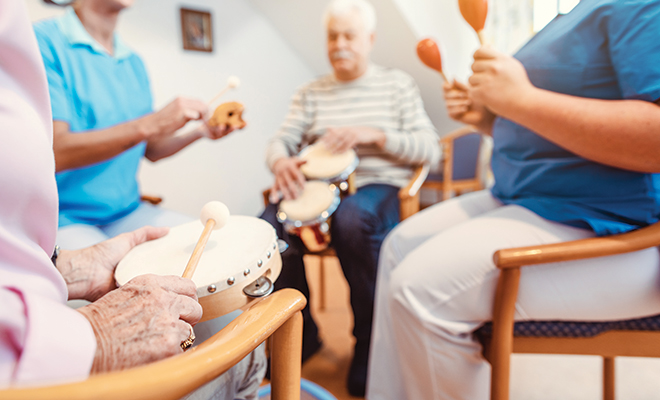
Drumming: A Connection to Memories, Fitness and Emotion
I was a drummer for many years in my youth. I think I initially got into it to meet cute guys. However, I discovered I had an aptitude for it and realized along the way the host of benefits it afforded me.
I discovered reduced stress, increased brain power, improved coordination skills, greater self-confidence, and even some surprising health and fitness benefits. When playing the drums, you are not sitting still. Let’s face it, too; we all seem to have that primal instinct to want to bang on a drum when we see one.
Drumming for older adults can be an effective means of fitness as well as a great activity to build strength, balance and coordination. The fact that it is also loads of fun is just an added perk. Drumming involves a rhythm associated with our primal instincts. It opens the door to both physical and psychological highs, both of which are instrumental (pun intended!) in giving seniors an overall uplifting feeling from head to toe.
A versatile instrument, a drum can be used in rehabilitation settings. Individuals don’t necessarily have to play the drum. They can reach for the drum, reach for a neighbor’s drum, or be surrounded by several drums to simulate a drum set. From there, a drumming pattern can be created that helps strengthen the core while the individual focuses on reaching to the right, the left, up, down, front and back.
Drums are easy to play and you don’t have to be musical to enjoy them. Available in a variety of options, such as frame drums, paddle drums and shape drums, they are easy to hold with two hands in the lap. They can be adaptable for arthritic hands and for individuals with other ailments. Mallet cuffs, for example, aid in playing the drum when a grasp is weak. For wheelchair-bound seniors, drums can be mounted for ease of access.
Drumming is beneficial for the immune system, and when done in groups, it “tunes our biology, orchestrates our immunity and enables healing to begin.” As evidenced by research from Dr. Harry Bittman, CEO of the Yamaha and Wellness Institute in Pennsylvania, group drumming has the ability to generate illness-killing cells, which can protect the body. His findings suggest group drumming can greatly increase the disease-fighting capabilities of white blood cells whose job is to hunt down and take out cancer cells, for example.
For seniors struggling with dementia or Alzheimer’s, drumming offers an outlet for self-expression. Through song and rhythm, drumming offers a way to reconnect with the world around them. Imagine stirring up memories from an old, familiar song and having them tap that out rhythmically on a drum. Drumming has a way of engaging seniors socially and giving them a chance to express their emotions, from joy to anger. For any pent-up feelings they may harbor, drumming is a great release and an avenue through which to express those emotions. Expansive studies have been conducted on the benefits of music to Alzheimer’s patients, too, suggesting music can reduce agitation with late stages of the disease. As a result, those individuals may tend to brighten up and become more alert and engaged, if only for a short time.
Drumming encourages increased fitness. As a physical activity, drumming stimulates certain parts of the brain that enable the limbs to do something different. Just as our hearts pump blood, life is about the rhythm, and drumming can simulate that beat.
Drumming offers a source of pain relief. Even chronic pain can subside when one is engaged in drumming. The activity promotes the release of endorphins, the body’s natural painkiller. It can also distract one from feelings of loneliness, isolation, grief and sadness. Further, drumming has been shown to aid in relaxation, which in turn can reduce blood pressure and stress.
Drumming can be enjoyed by everyone of all ages and cultures. It is a wonderful way to meet new people, contribute to songs, and it’s a global language that is easy to understand. For older adults who tend to be reclusive, drumming is a great way to connect with others in a way they normally would not. It fosters a sense of community.
Research is ongoing with respect to the numerous health benefits of drumming, especially for seniors. To quote an unknown source, “when you can’t feel anything else, you can always feel the beat.” With drumming, you don’t have to worry about whether or not you can do it; instead, you can focus on what you can do with it. Portable and easy to play, a drum can be loud or soft, is portable, expressive and stands at the foundation of all music. It allows us all to march to the beat of our own drum in a way that suits us best. ■
Sources: washingtonpost.com, lifehack.org, drummagic.net and katfulton.com.







